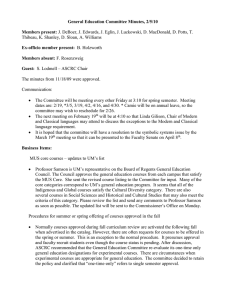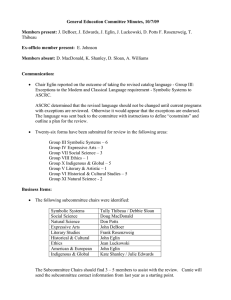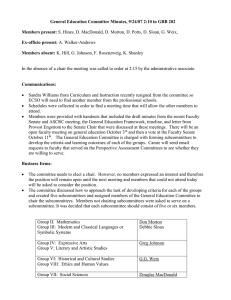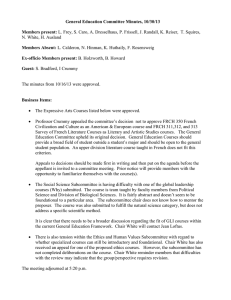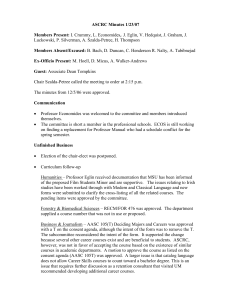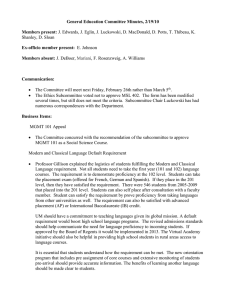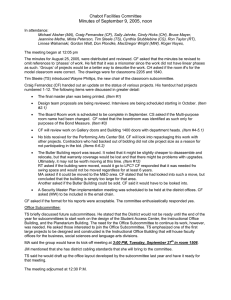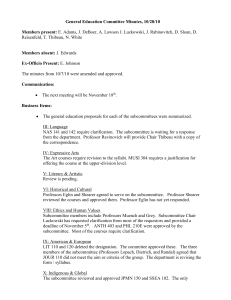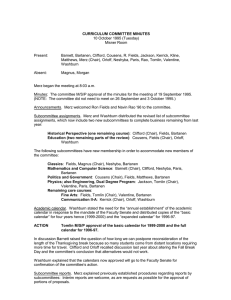General Education Committee Minutes, 10/7/10 Members present: Members absent:
advertisement
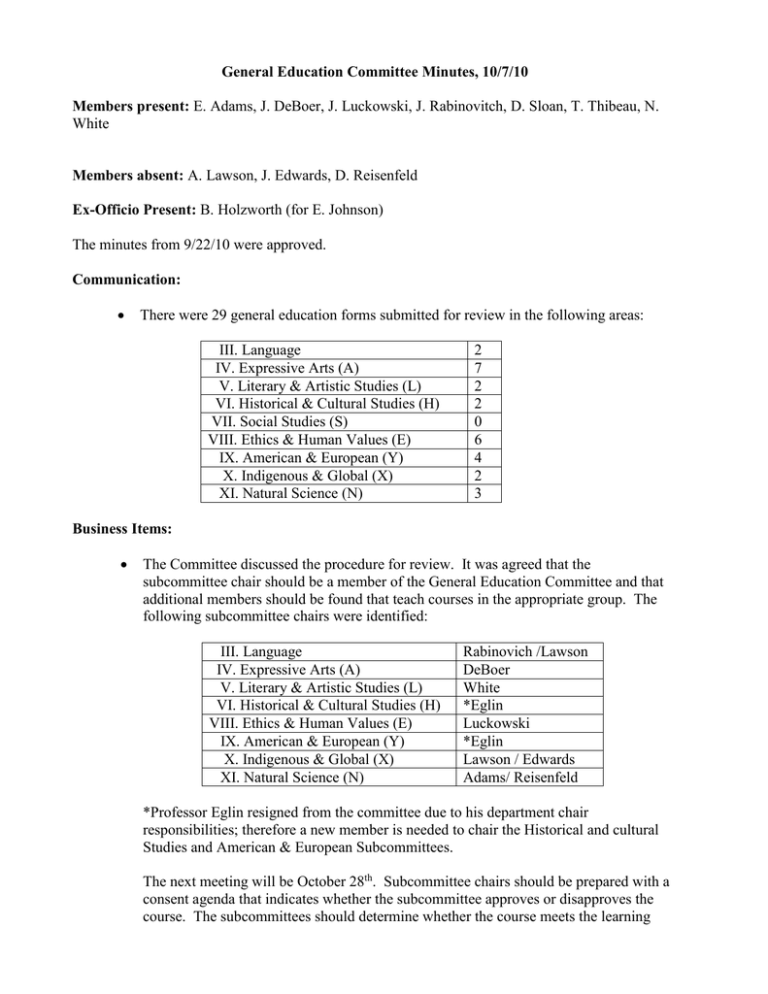
General Education Committee Minutes, 10/7/10 Members present: E. Adams, J. DeBoer, J. Luckowski, J. Rabinovitch, D. Sloan, T. Thibeau, N. White Members absent: A. Lawson, J. Edwards, D. Reisenfeld Ex-Officio Present: B. Holzworth (for E. Johnson) The minutes from 9/22/10 were approved. Communication: There were 29 general education forms submitted for review in the following areas: III. Language IV. Expressive Arts (A) V. Literary & Artistic Studies (L) VI. Historical & Cultural Studies (H) VII. Social Studies (S) VIII. Ethics & Human Values (E) IX. American & European (Y) X. Indigenous & Global (X) XI. Natural Science (N) 2 7 2 2 0 6 4 2 3 Business Items: The Committee discussed the procedure for review. It was agreed that the subcommittee chair should be a member of the General Education Committee and that additional members should be found that teach courses in the appropriate group. The following subcommittee chairs were identified: III. Language IV. Expressive Arts (A) V. Literary & Artistic Studies (L) VI. Historical & Cultural Studies (H) VIII. Ethics & Human Values (E) IX. American & European (Y) X. Indigenous & Global (X) XI. Natural Science (N) Rabinovich /Lawson DeBoer White *Eglin Luckowski *Eglin Lawson / Edwards Adams/ Reisenfeld *Professor Eglin resigned from the committee due to his department chair responsibilities; therefore a new member is needed to chair the Historical and cultural Studies and American & European Subcommittees. The next meeting will be October 28th. Subcommittee chairs should be prepared with a consent agenda that indicates whether the subcommittee approves or disapproves the course. The subcommittees should determine whether the course meets the learning outcomes and criteria. Subcommittee chairs may contact requestors for clarification or modifications to the forms/ syllabi. Chair Thibeau will document the review process procedure for continuity in the future. It would be helpful for requestors to have access to sample general education forms. Subcommittee members should identify exemplary forms during the review process. RSCN/EVST 295 Resource Conservation was identified as a sample form for the Ethics group last year. It will be posted as a reference. There have been several correspondences regarding the mathematics requirement language, but no resolution. Professor Sloan will review the language. Discussion of the symbolic system issue was postponed. [Rather than asking academic advisors to assist with creating a standard for counting credits, Associate Provost Walker-Andrews recommends using the Registrar’s Office as a resource. Registrar Johnson was contacted and he is asking the graduation coordinators for information. ] Members were provided with a copy of the Association of American Colleges and Universities’ (AACU) Essential Learning Outcomes. The Board of Regents’ General Education Council is applying these outcomes to the MUS System Core. Associate Provost Walker Andrews is also going to use the Outcomes for assessment of UM’s general education program. Assessment of general education was recommended for improvement by the accreditation team. She would like the committees’ help in mapping the Outcomes and value rubrics to the general education preamble. Academic Affairs has applied for an AACU grant to help fund the project. General education assessment was attempted at the group level, but proved difficult in terms of appropriate assignments across the groups. In regards to the new accreditation standards / process, the Committee will be asked to assist in identifying the core themes and to incorporate the big ideas/questions to the current general education structure. The core themes must be identified by March 1st. The themes should be articulated in a way that distinguishes UM from other institutions. One theme will likely address undergraduate education. The University will need to identify indicators and matrixes to show how it is making progress towards the core theme goals over the next 7 years. The meeting was adjourned at 11:00 a.m. The Essential Learning Outcomes Beginning in school, and continuing at successively higher levels across their college studies, students should prepare for twenty-first-century challenges by gaining: Knowledge of Human Cultures and the Physical and Natural World • Through study in the sciences and mathematics, social sciences, humanities, histories, languages, and the arts Focused by engagement with big questions, both contemporary and enduring Intellectual and Practical Skills, including • Inquiry and analysis • Critical and creative thinking • Written and oral communication • Quantitative literacy • Information literacy • Teamwork and problem solving Practiced extensively, across the curriculum, in the context of progressively more challenging problems, projects, and standards for performance Personal and Social Responsibility, including • Civic knowledge and engagement—local and global • Intercultural knowledge and competence • Ethical reasoning and action • Foundations and skills for lifelong learning Anchored through active involvement with diverse communities and real-world challenges Integrative and Applied Learning, including • Synthesis and advanced accomplishment across general and specialized studies Demonstrated through the application of knowledge, skills, and responsibilities to new settings and complex problems
